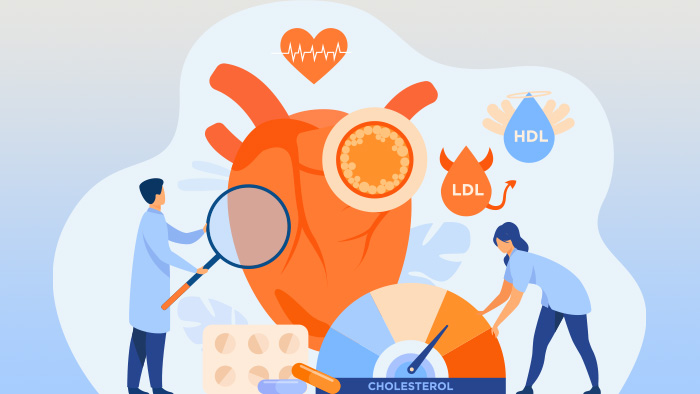
Research indicates that nearly 38% of US adults aged 20 years or older have high cholesterol, which puts them at a higher risk for heart attack and stroke. But high cholesterol can be "silent." "If you have high cholesterol, you'd never know it, because it causes no symptoms," Janet S. Wright, MD, FACC, director of CDC's Division for Heart Disease and Stroke Prevention in the US said. "That's why it's so important to get your cholesterol levels checked regularly."
You've probably heard of high cholesterol. Let's make sure you have the facts about what it is, who is at risk, and how to prevent high cholesterol.
Is all cholesterol bad?
Cholesterol is a fatty, waxy substance that is made by your liver and is also found in certain foods. Cholesterol, which travels through the blood on proteins called lipoproteins, is necessary to make hormones, protect nerves, and more. But the risk of heart attack and stroke rises when a person has high levels of the bad cholesterol, known as LDL (low-density lipoproteins), or low levels of the good cholesterol, known as HDL (high-density lipoproteins). HDL removes cholesterol from your bloodstream back to your liver and out of the body. The higher your HDL lever the lower your risk for heart attack and stroke.
Over time, high levels of LDL or low levels of HDL can cause deposits in walls of arteries throughout the body. This "plaque," a mixture of fat, calcium, cholesterol, and more, can cause the artery to gradually narrow, limiting blood flow to the organ. The plaque can also suddenly rupture, closing the artery and causing organ damage, such as a heart attack or stroke.
So, you want to keep your total cholesterol and LDL levels low and your HDL high. A healthy total cholesterol level is below 200 mg/dL. Depending on other risk factors you have, you should aim for an LDL level of 100mg/dL or lower, and an HDL level of 40mg/dL or higher for men and 50 mg/dL or higher for women. Regular blood cholesterol checks can help you manage your levels.
What causes high cholesterol?
Certain health conditions can increase your risk for high cholesterol. They include:
* Type 2 diabetes.
* Obesity.
* Familial hypercholesterolemia (FH), a genetic condition causing a very high LDL.
Lifestyle choices can also increase your risk. These include:
* Diet high in saturated and trans fat.
* Low physical activity.
* Smoking tobacco.
Age, sex, and family history also can increase your risk.
Can you prevent high cholesterol?
Regular cholesterol checks will help you keep your levels under control. Your doctor may recommend diet and exercise and possibly medicine, to help you achieve control.
Eat a diet rich in fresh fruits, vegetables, and whole grains. The more colorful your foods, the better. Get protein from low-saturated fat sources, such as fish and chicken, beans, nuts, and seeds. Eat less of foods that are high in saturated fats, such as red meat, cheese, and butter. Choose low-fat dairy or fortified soy products.
Regular physical activity is vital to control your weight, lower triglycerides (a type of fat that is harmful if present in high levels),) and increase HDL cholesterol. The Physical Activity Guidelines for Americans recommends that adults get 150 to 300 minutes of moderate physical activity each week Also, small amounts of physical activity add up, so take brisk walks, ride a bicycle, or use the stairs to increase activity.
"Smoking harms many parts of the body, including the heart, brain, and blood vessels all over the body. Tobacco use speeds up that plaque formation in the arteries, increasing the risk for heart attack and stroke," said Dr. Wright. "Quitting at any age can lower your risk for heart disease. My advice is simple: If you don't smoke, don't start. If you do smoke, quit."
High triglycerides, combined with low HDL or high LDL, can increase your risk for heart attack and stroke.
Finally, your doctor may prescribe a medicine, usually a statin, to control cholesterol levels if you have heart disease, a family history of heart disease, diabetes, or have been unable to manage cholesterol with diet and exercise alone. Work with your health care team to find the best ways for you to control cholesterol.